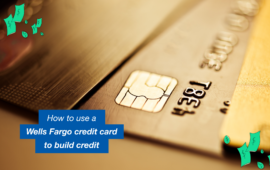What are Credit Builder Loans and How Do They Work?
About Harrison
Harrison Pierce is a writer and a digital nomad, specializing in personal finance with a focus on credit cards. He is a graduate of the University of North Carolina at Chapel Hill with a major in sociology and is currently traveling the world.
Read full bio
At a Glance
Credit builder loans are a financial product designed to help borrowers build or maintain their credit scores. With this loan, the lender places the money received from the borrower into a savings account. This account is not accessible to the borrower until all payments have been made in full. The borrower then makes regularly scheduled payments with an interest rate applied over an agreed-upon period.
As an added benefit, once the final payment is made and the loan is repaid in full, the borrower earns access to their savings plus any accrued interest. This provides a financial reward for successful debt repayment and building or maintaining that borrower’s credit score due to regularly reporting on-time payments to credit bureaus.
- What is a credit builder loan?
- How do credit builder loans work?
- Pros and Cons of credit builder loans
- Where can you get a credit builder loan?
- How to apply for a credit builder loan?
- How to manage the loan after securing it?
- How will a credit builder loan help your credit?
- Are credit builder loans a good idea?
- More options to build and improve credit
- FAQs
What is a credit builder loan?
A credit builder loan is a type of loan that is designed to help individuals with little or no credit history establish or improve their credit scores. The loan is typically for a small amount of money and is repaid over time, with the lender reporting the borrower’s payment history to the credit bureaus. The idea is that by making on-time payments, the borrower can demonstrate their ability to handle credit responsibly and improve their credit score.
How do credit builder loans work?
Credit builder loans provide the borrower with a small loan, typically a few hundred or a few thousand dollars. The borrower then repays the loan over a period of 12 to 24 months. During this time, the lender will report the borrower’s payment activity to the credit bureaus, which can help to establish or improve the borrower’s credit history.
When the loan is first taken out, the funds are usually held by the lender and not released to the borrower until the loan is fully repaid. This is done to ensure that the funds are used for the intended purpose of building credit.
To qualify for a credit builder loan, the borrower must have a steady income and a checking or savings account. The interest rate on a credit builder loan may be higher than on other types of loans, but it is often lower than the interest rate on a credit card.
It’s worth noting that, by themselves, credit builder loans may not be sufficient to establish a good credit history. Credit bureaus also consider other factors such as credit mix, credit utilization, and credit age. But when combined with a good payment history and other credit-building strategies, credit builder loans can improve one’s credit score.
Pros and Cons of credit builder loans
Pros of credit builder loans:
- They can help establish or improve credit history: By making on-time payments, the borrower can demonstrate their ability to handle credit responsibly, which can help to develop or improve their credit score.
- They can be a good option for those with no credit history: Credit builder loans are often available to individuals with little or no credit history, making them a good choice for those who are just starting to build their credit.
- They can be an excellent alternative to high-interest credit cards: The interest rate on a credit builder loan may be higher than on other types of loans, but it is often lower than the interest rate on a credit card, making them a more affordable option for those with bad credit.
- They can help to save money: Some credit builder loans hold the loaned amount in a savings account, which the borrower can access once the loan is repaid. This can help the borrower to save money while building credit.
Cons of credit builder loans:
- They may have high interest rates: Credit builder loans may have higher rates than traditional loans, making them more expensive in the long run.
- They may have limited loan amounts: Credit builder loans typically have smaller loan amounts than traditional loans, which may not be sufficient for larger expenses.
- They may have a short repayment term: The repayment term for credit builder loans is usually shorter than traditional loans, making it challenging to repay the loan quickly.
- It might take time to see the results on credit score: It might take some time before the credit bureaus reflect the positive payment history on the credit score, which might be a concern for those in urgent need of credit.
Where can you get a credit builder loan?
Credit builder loans can be obtained from various sources, including banks, credit unions, online lenders, non-profits, and alternative loan providers. It’s essential to shop around and compare the terms and rates of different credit builder loans before deciding. You can check for credit builder loans from different institutions, read the terms and conditions and ensure you understand the fees, interest rates, and the length of the repayment terms before committing to a loan.
1. Online lenders
Getting a credit builder loan from an online lender is straightforward. First, you should look for online lenders specializing in credit builder loans and compare the terms, rates, and fees of different lenders. Each lender has eligibility criteria, such as income, credit score, and employment status, so make sure you meet the lender’s requirements before applying.
Most online lenders have an easy application process that can be completed online. You will be required to provide information such as your name, address, income, employment status, or other additional documentation.
If your application is approved, you will be required to sign a loan agreement and provide any additional documentation that may be required. After the loan agreement is signed, the lender will deposit the loan funds into a savings account or CD account, where the funds will be held until the loan is repaid.
It’s essential to remember that credit builder loans from online lenders may have higher interest rates than traditional loans, so it’s vital to read and understand the terms and conditions before signing the loan agreement.
2. Credit Unions
You can also research local credit unions in your area and check if they offer credit builder loans. To be eligible for a loan from a credit union, you will need to become a member. This usually involves opening a savings account with a small deposit and paying a one-time membership fee.
Each credit union has its own set of other eligibility criteria, such as income, credit score, and employment status. The application will be just as straightforward as the online lender application but can often be done by phone or person.
Credit unions may have more flexible lending practices and lower interest rates than financial institutions. It’s essential to ask about the specific terms and conditions of the credit builder loan and compare it with other options before deciding.
3. Community banks and CFDIs
Getting a credit builder loan from a community bank or a Community Development Financial Institution (CDFI) typically involves many of the same steps as an online lender or credit union.
First, look for community banks and CDFIs in your area and check if they offer credit builder loans. Make sure you meet their requirements before you submit your application.
Community banks and CDFIs may have more flexible lending practices and lower interest rates than financial institutions. It’s important to ask about the specific terms and conditions of the credit builder loan and compare it with other options before planning. Some CDFIs focus on serving a particular community, such as low-income or minority communities.
4. Lending circles
Lending circles are a form of peer-to-peer lending where individuals come together to lend and borrow money. They can be an alternative to traditional financial institutions and can be found in many communities. It’s important to understand the specific terms and conditions of the credit builder loan and compare it with other options before deciding.
You can find lending circles through community organizations, non-profits, or online platforms. To be eligible for a loan from a lending circle, you will need to become a member by joining the lending circle.
How to apply for a credit builder loan?
The process of applying for a credit builder loan may vary depending on the lender, but generally, it involves the following steps:
- Research different lenders: Look for lenders that offer credit builder loans and compare the terms, rates, and fees of other lenders.
- Check your eligibility: Each lender has eligibility criteria, such as income, credit score, and employment status. Make sure you meet the lender’s requirements before applying.
- Complete the loan application: Most lenders have a straightforward application process that can be completed online, by phone, or in person. You will be required to provide information such as your name, address, income, and employment status.
- Submit required documentation: Some lenders may require you to submit additional documentation, such as a copy of your ID, proof of income, or bank statements.
- Wait for approval: After submitting your application and the required documentation, you will need to wait for the lender to review and approve your application.
- Sign the loan agreement: If your application is approved, you will be required to sign a loan agreement and provide any additional documentation that may be required.
- Receive the funds: After the loan agreement is signed, the lender will deposit the loan funds into a savings account or CD account, where the funds will be held until the loan is repaid.
It’s essential to read and understand the terms and conditions of the credit builder loan before applying, including the interest rate, the length of the repayment terms, and the fees, if any. And also, it’s essential to ensure that the lender reports the borrower’s payment history to the credit bureaus.
How to manage the loan after securing it?
Managing a credit builder loan, once you secure it, it is vital to ensure that you can make the payments on time and improve your credit score. Review your income and expenses to determine how much you can afford to repay the loan each month. If you are having trouble making payments, reach out to the lender as soon as possible. They may be able to work with you to come up with a solution.
It’s also important to remember that credit builder loans are not a quick fix to a credit problem, and it can take time to see an improvement in your credit score. It’s important to maintain good credit habits, such as making payments on time, keeping credit balances low, and diversifying your credit accounts even after you’ve paid off the loan.
1. Make timely payments
The point of credit builder loans is to show lenders that you are a responsible borrower. So, you always need to make timely payments. You can set up autopay or reminders to ensure that your payments are made on time and that you do not miss any payments. Make sure you know when your payments are due and keep records of when you make payments and how much you pay. Credit builder loans typically have higher interest rates than other types of loans, so it’s best to pay off the loan as soon as possible to minimize interest charges.
2. Monitor your credit score
Monitoring your credit score when using a credit builder loan is important because it will help you track your progress and ensure that the loan positively impacts your credit score. It will also allow you to catch and address any errors or inaccuracies on your credit report that may negatively impact your score. Additionally, monitoring your credit score will help you identify when it is an excellent time to apply for other types of credit, such as a mortgage or car loan.
Learn more: Monitoring your credit
3. Utilize the loan money wisely
To utilize credit builder loan money wisely, you should use the funds to build or establish credit rather than for unnecessary or frivolous expenses. One way to do this is to use the loan to make regular, on-time payments to the lender, demonstrating your ability to manage credit responsibly. Additionally, you may consider using the loan funds to pay off any existing debt, such as high-interest credit card balances, which will improve your debt-to-income ratio and increase your credit score. Lastly, it’s crucial to have a budget plan and stick to it, don’t take more than you can afford to pay back, and keep track of your expenses to avoid overspending.
How will a credit builder loan help your credit?
A credit builder loan can help your credit in several ways:
- Payment history: By making regular, on-time payments on a credit builder loan, you can demonstrate to lenders that you are responsible with credit, which can help improve your credit score.
- Credit utilization: Credit builder loans usually have a low credit limit, and by keeping your balances low, you will be able to maintain a low credit utilization rate, which can also help improve your credit score.
- Credit mix: Having a mix of different types of credit, such as a credit card and a loan, can help improve your credit score. A credit builder loan will add a loan to your credit mix, which can help diversify your credit history.
- Credit history: A credit builder loan is a loan, which means that it will be reported to the credit bureaus when you make payments. This can help establish a credit history if you don’t have one.
Building credit takes time and consistent effort. You will need to continue making on-time payments, maintain low credit balances and diversify your credit accounts to improve your credit score significantly.
Are credit builder loans a good idea?
Credit builder loans can be a good idea for some people, but they may not be the best option for everyone. A credit builder loan is a type of loan that is designed to help individuals establish or rebuild their credit. These loans are typically small, with low interest rates and manageable monthly payments. By making regular payments on a credit builder loan, you can demonstrate to lenders that you are responsible with credit and improve your credit score over time.
However, credit builder loans are not for everyone. For example, you may not need a credit builder loan if you have a stable income and a good credit score. Also, if you can’t afford the payments, it may be best to look for other options. Additionally, you should be aware that traditional banks do not always offer credit builder loans, and some lenders may charge high fees or interest rates.
More options to build and improve credit
There are several other options to improve credit other than credit builder loans. You could become an authorized user on someone else’s credit card account with a good payment history, get a secured credit card, or take out a personal loan and make regular, on-time payments. You can also consider credit counseling or debt management programs, which can help you develop a budget and plan to pay off your debts. You can also consider opening a savings account and making regular deposits. This shows lenders that you are responsible and can manage money.
1. Personal loans
Personal loans can be a valuable tool to help build up credit, especially for those with little or no credit history or those who have had credit problems. A personal loan is not secured by collateral, such as a car or a home. It can be used for various purposes, like debt consolidation, home improvement, or medical expenses.
By taking out a personal loan and making regular, on-time payments, you can establish a positive payment history and demonstrate to lenders that you can handle credit. The loan activity will be reported to the credit bureaus, and your credit score will improve as you build a positive credit history. Additionally, having a personal loan account in your name can increase the length of your credit history, which can also help improve your credit score.
Remember that personal loans usually have higher interest rates than secured loans like a mortgage or car loan, so making sure you can afford the payments before taking out a personal loan is essential. Also, applying for too many loans in a short period can harm your credit score, so it’s necessary to shop around and compare the terms of different loans before deciding.
Learn more: How personal loans can improve credit score
A personal loan is one way to build your credit.
Find & compare the best personal loans for credit building in 2023.
2. Secured credit cards
Secured credit cards can be a helpful tool to help build up credit. A secured credit card is a type of credit card backed by a cash deposit you make with the lender. The deposit acts as collateral, and the credit limit usually equals the deposit amount. Because of the collateral, secured credit cards are generally easier to get approved for than traditional credit cards, making them a good option for people with little or no credit history or those with credit problems in the past.
Using a secured credit card responsibly and making payments on-time can establish a positive payment history and demonstrate to lenders that you can handle credit. Your credit activity will be reported to the credit bureaus, and your credit score will improve as you build a positive credit history. Additionally, having a credit card account in your name can increase the length of your credit history, which can also help improve your credit score. Most credit card companies will return the deposit after a certain period (6-12 months) if the account is in good standing.
Related: Credit cards for people with bad credit
3. Become an authorized user
Becoming an authorized user on someone else’s credit card can be a valuable way to build up credit, especially if the primary cardholder has a good credit history. As an authorized user, you can use the credit card to make purchases, but you will not be responsible for paying the bill. However, the account’s payment history will be reported to the credit bureaus and included in your credit report. If the primary cardholder consistently makes on-time payments, those payments will be reflected in your credit report and can help improve your credit score. Additionally, having a credit card account in your name can increase the length of your credit history, which can also help improve your credit score. Not all lenders report authorized user information to the credit bureaus, so it’s best to check with the lender first before becoming an authorized user.
Learn more: How to build and improve credit
FAQs
The amount of money you can get with a credit builder loan varies and typically ranges from a few hundred dollars to a few thousand dollars, depending on the lender and your creditworthiness. The primary purpose of a credit builder loan is to help you establish or rebuild your credit rather than to provide a large sum of money.
A credit builder loan application process may involve a hard inquiry on your credit report, depending on the lender. A hard inquiry is a credit check performed when a lender or creditor reviews your credit report to evaluate your creditworthiness. These inquiries can have a slight negative impact on your credit score.
When a lender makes a hard inquiry, it requests a copy of your credit report from one or more credit bureaus. The inquiry will be listed on your credit report and remain for two years. Each hard inquiry can lower your credit score by a few points, but the effect is usually temporary.
It’s worth noting that some credit builder loan providers do not perform a hard inquiry. They may use a soft inquiry or no inquiry at all. A soft inquiry, also known as a “soft pull,” is a credit check performed when a lender or creditor reviews your credit report to pre-approve you for a product or service or to check your account status. Soft inquiries will not affect your credit score.
So, it’s a good idea to check the loan agreement and understand the lender’s policy on credit checks before signing the loan agreement, so you can be aware of whether a hard inquiry will be made.
Related: Hard credit inquiry
It depends on the lender’s policy. Some lenders may allow borrowers to pay off a credit builder loan early without penalty, while others may charge a prepayment penalty. A prepayment penalty is a fee that lenders charge when a borrower pays off a loan before the end of the loan term.
It’s essential to check the loan agreement and understand the lender’s policy on prepayment before signing the loan agreement. If the lender has a prepayment penalty, you may want to consider the penalty’s cost when deciding whether to pay off the loan early.
If you decide to pay off your credit builder loan early, check if the lender reports to the credit bureau about the early repayment, as it will be reflected on your credit score. Paying off a credit builder loan early can show that you are responsible with credit and can be a positive factor in your credit history. Still, it can also shorten the credit history, which can be considered a negative factor.
In summary, it can be a good move if you can pay off your credit builder loan early without incurring a penalty, it can be a good move. But if there is a penalty, you should weigh the costs and benefits before deciding.
Related: Prepayment penalty on personal loan








